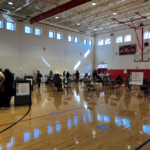
Daniel Zhao, Senior Photographer
On Wednesday, the Connecticut General Assembly Education Committee held a hearing for multiple bills relating to education funding, three of which — SB 866, SB 948 and SB 949 — have elicited local opposition.
New Haven Public Schools Superintendent Iline Tracey and local parent group New Haven Public Schools Advocates both released public letters to Elm City parents in the past week, calling for unified opposition to the bills. SB 866 would implement Connecticut Gov. Ned Lamont’s proposed freeze to Education Cost Sharing payments, which are state funds given to local school districts including NHPS. ECS payments account for over 50 percent of Connecticut’s contribution to public elementary and secondary education. SB 949 would create a school voucher system so that per-student funding can move schools with the student.
At the hearing, testimony largely revolved around SB 948, which would fund public and charter schools using the same ECS formula.
“[SB 948] has been a longtime goal of charter school advocates, in order to put charter schools on equal funding footing with traditional public schools, but without the public accountability or responsibility,” Tracey wrote in her letter.
SB 948 would, for one, significantly alter the ECS allocation formula, increasing the fund a district would receive for its English language learner students based on its concentration of poverty. At the same time, it would also add charter schools to the equation, likely increasing the funds these schools receive. Unlike SB 866, the bill would require ECS payments to be fully funded in the fiscal year 2021-22, which would make sure ECS funding continues despite the governor’s proposed budget that pauses it. This change — some Connecticut school officials, including Tracey, worry — could result in a drop in funds for standard public schools. SB 948 was also opposed in the local letters.
New Haven Public Schools Advocates member Sarah Miller told the education committee that while there are “well-intentioned funding increases” within SB 949, she opposes the formula because she believes it implies that charter schools serve the same responsibilities for the community as public schools despite the limited number of students charter schools serve.
“I don’t want choice,” Miller said in her testimony. “I want to be able to send my children to this neighborhood school and for it to be a good school.”
Despite local opposition, several superintendents across the state have expressed support of SB 948. Both Superintendent Joseph DiBacco from Ansonia Public Schools and Superintendent Leslie Torres-Rodriguez from Hartford Public Schools expressed support for SB 948 in written testimony to the state education committee. House Majority Leader Jason Rojas also spoke in favor of SB 948 due to the changes in the ECS formula that place more emphasis on districts with a higher concentration of poverty.
The Connecticut Charter Schools Association, which represents 21 of the state’s charter schools, has also added its support, calling the bill essential in creating a more equitable education system in the Nutmeg State.
“Students should be equitably funded in a unified funding formula that accounts for their learning needs, regardless of where they come or their background or family circumstances,” CCSA Executive Director Ruben Felipe wrote in his testimony to the committee.
Felipe pushed back on claims that the bill would divert funding from public schools, characterizing the claims as “misinformation.”
“You might have heard that folks referred to the lack of accountability for charter schools, which is a blanket lie,” Felipe told the News.
The other two bills at the hearing that have been met with local opposition are SB 866 and SB 949.
SB 866 would implement recommendations made in Lamont’s proposed state budget. The governor’s proposal, which was released in February, would freeze an increase in ECS payments, potentially causing New Haven Public Schools to lose $9,000,000 over 2 years, if approved. Two weeks ago, Tracey signed a separate letter alongside other Connecticut superintendents in opposition to the ECS freeze.
The last of the opposed bills, SB 949, would establish a school voucher system so that per-student funding can be moved to whichever school a student attends through the district’s choice programs. The bill does this by splitting the cost of choice program funding between the state government and home districts, with the split being determined by what the state sends the home district in the ECS per pupil.
NHPS Chief Financial Officer Phillip Penn has unveiled a $198 million “status quo” budget for the upcoming fiscal year.
Alvaro Perpuly | christian.robles@yale.edu
Christian Robles | christian.robles@yale.edu










